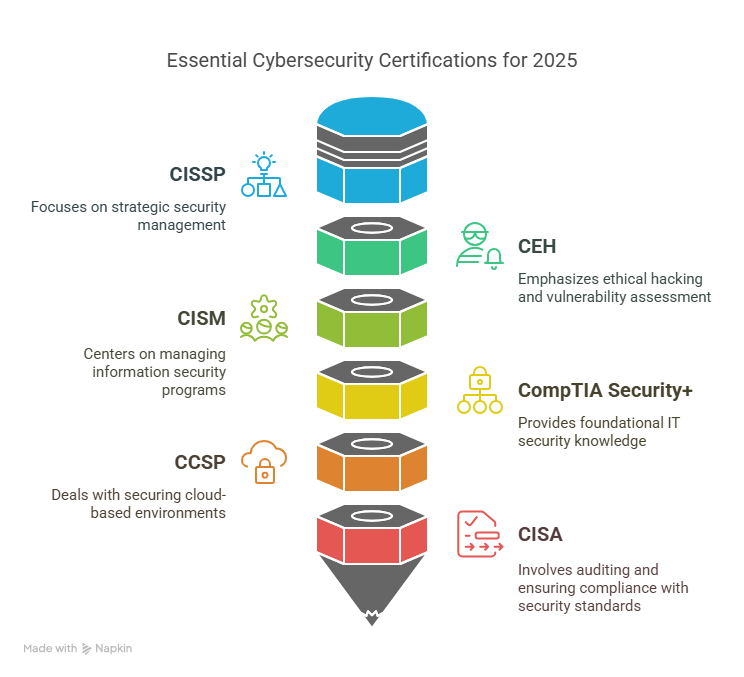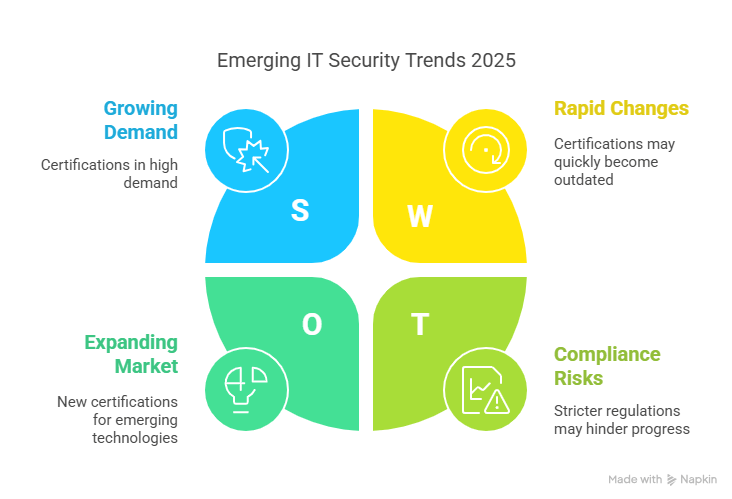In today's fast-evolving digital landscape, organizations face increasing cyber threats from malicious actors who are becoming more sophisticated every day. As a result, the demand for highly skilled cybersecurity professionals is on the rise. The right IT security certifications can make all the difference in securing your role in this high-demand field. With 2025 on the horizon, it is essential for professionals in the cybersecurity space to understand the certifications that will help them stay relevant and in demand.
Free Cybersecurity Certification Reddit discussions have also become a helpful resource for those seeking affordable and community-recommended learning paths. In this blog, we will explore the top IT security certifications that will be highly valuable in 2025, focusing on their relevance, the skills they offer, and why they are crucial in today’s digital world. Additionally, we’ll cover evolving trends that are reshaping the certification landscape and helping professionals advance their careers.
Why IT Security Certifications Matter in 2025
The need for robust cybersecurity measures has become more critical than ever. According to Cybersecurity Ventures, cybercrime damage costs are projected to hit $10.5 trillion annually by 2025. With such high stakes, organizations are eager to hire skilled professionals who can protect their systems and data.
In 2025, the landscape of cybersecurity will continue to be complex and dynamic, with new technologies like AI and quantum computing emerging to both challenge and enhance security efforts. IT security certifications validate the knowledge and skills required to address these challenges effectively. They demonstrate your expertise, provide you with in-depth technical knowledge, and help you stay updated with the latest industry practices.
By obtaining relevant certifications, you not only increase your employability but also boost your career progression in the rapidly expanding cybersecurity sector.
Top IT Security Certifications for 2025
The following certifications are highly regarded within the cybersecurity industry and are expected to remain in demand throughout 2025.

1. Certified Information Systems Security Professional (CISSP)
The CISSP certification, offered by ISC2, is recognized as one of the gold standards in cybersecurity certifications. It is particularly beneficial for professionals seeking roles in security management, overseeing a comprehensive security program for an organization.
Why CISSP is Important for 2025:
-
Relevance: As security threats become more advanced, companies are seeking CISSP-certified professionals who can think strategically and manage security initiatives effectively.
-
Key Domains Covered: CISSP covers a broad range of topics, including risk management, asset security, security operations, and software development security.
Why It’s Valuable in 2025: The ever-growing complexity of security risks makes it essential for businesses to have security professionals who can manage and mitigate these risks at a strategic level. CISSP remains a leading certification for professionals in managerial roles who need to design, implement, and manage comprehensive security frameworks.
2. Certified Ethical Hacker (CEH)
The Certified Ethical Hacker (CEH) credential, awarded by EC-Council, is one of the most recognized certifications for penetration testing and ethical hacking. CEH professionals use the same techniques as malicious hackers to assess systems' vulnerabilities but do so legally and with authorization.
Why CEH is Important for 2025:
-
Relevance: With an increase in sophisticated attacks like ransomware and phishing, businesses need ethical hackers to identify weaknesses before hackers exploit them.
-
Key Skills Gained: CEH equips professionals with skills to perform penetration testing, identify vulnerabilities, and provide recommendations to strengthen defenses.
Why It’s Valuable in 2025: As cybercriminals grow more sophisticated, organizations will rely on ethical hackers to test their systems. The ability to prevent cyberattacks before they happen will remain a critical skill in the cybersecurity toolkit. CEH ensures that professionals are capable of identifying vulnerabilities and testing the security of complex systems.
3. Certified Information Security Manager (CISM)
The CISM certification from ISACA is one of the most sought-after certifications for professionals who focus on managing an organization’s information security program. CISM is recognized for its emphasis on the management and governance of cybersecurity strategies.
Why CISM is Important for 2025:
-
Relevance: As organizations continue to expand their digital infrastructure, the need for leaders who can manage information security initiatives is growing.
-
Key Domains Covered: The certification focuses on governance, risk management, incident response, and security program development.
Why It’s Valuable in 2025: The global demand for information security managers is on the rise as cybersecurity becomes a priority for businesses of all sizes. CISM-certified professionals are prepared to handle the complexities of creating and managing an organization's cybersecurity policies, ensuring data protection, and driving strategic security decisions.
4. CompTIA Security+
The CompTIA Security+ certification is one of the most common entry-level cybersecurity certifications. It provides foundational knowledge in IT security and is recognized globally by employers across industries. Security+ covers network security, access control, cryptography, and risk management.
Why CompTIA Security+ is Important for 2025:
-
Relevance: It is a critical certification for anyone entering the field of cybersecurity or seeking to move into a more specialized role.
-
Key Skills Gained: Security+ teaches the basics of network security, compliance, and operational security, as well as the principles of risk management and encryption.
Why It’s Valuable in 2025: As the cybersecurity industry grows, so does the need for professionals who understand the fundamentals. Security+ will remain an essential certification for professionals looking to build a career in cybersecurity, especially for those seeking to work in network administration and security.
5. Certified Cloud Security Professional (CCSP)
With the rise of cloud computing, the Certified Cloud Security Professional (CCSP) certification has become indispensable for IT professionals seeking to secure cloud-based environments. Offered by ISC2, CCSP equips professionals with the knowledge to manage cloud security risks and comply with cloud security standards.
Why CCSP is Important for 2025:
-
Relevance: As organizations continue their digital transformation by moving to the cloud, the need for cloud security professionals is growing rapidly.
-
Key Domains Covered: The certification focuses on securing cloud infrastructures, data protection, and identity management, and it provides insights into cloud governance, risk, and compliance.
Why It’s Valuable in 2025: The proliferation of cloud-based services means that businesses must ensure their cloud environments are secure from the same threats that affect on-premises systems. CCSP-certified professionals will continue to play a pivotal role in safeguarding cloud data and preventing breaches.
6. Certified Information Systems Auditor (CISA)
The CISA certification from ISACA is highly respected for professionals focusing on auditing, controlling, and securing information systems. CISA-trained auditors are responsible for assessing an organization’s compliance with internal and external security standards and regulations.
Why CISA is Important for 2025:
-
Relevance: Regulatory compliance continues to become more stringent, and CISA professionals are essential to ensure organizations meet security standards and regulations.
-
Key Skills Gained: CISA professionals learn how to audit information systems, evaluate system vulnerabilities, and ensure compliance with standards such as SOX, HIPAA, and PCI-DSS.
Why It’s Valuable in 2025: With the rise of data protection regulations like GDPR and CCPA, businesses will rely on CISA professionals to ensure compliance and prevent legal and financial repercussions.
Emerging Trends in IT Security Certifications for 2025
As the cybersecurity landscape continues to evolve, so do the certifications that IT professionals need to remain competitive. Here are some key trends in the industry:

-
Increased Focus on Cloud Security: As more businesses migrate to the cloud, cloud security certifications like CCSP will become increasingly important.
-
AI and Machine Learning Integration: As artificial intelligence becomes a key player in cybersecurity, future certifications will likely include specialized knowledge of AI-driven security tools and automation.
-
Quantum Computing: With the advent of quantum computing, there is a growing need for certifications in quantum-safe cryptography to prepare for potential threats to current encryption methods.
-
Regulatory Compliance: With stricter data protection laws coming into play globally, certifications related to compliance (e.g., CISA) will continue to be in high demand.
Conclusion
In 2025, the demand for skilled IT security professionals will be at an all-time high, driven by the growing threat landscape and the increasing complexity of cyberattacks. Obtaining an IT security certification is essential for professionals looking to stay competitive in the cybersecurity field.
At ACSMI, we offer Cybersecurity Certifications designed to keep you ahead in the rapidly changing world of security technology. Whether you are just starting your cybersecurity career or looking to deepen your expertise, our certifications provide you with the knowledge and skills necessary to succeed in this high-demand field.
10 Lesser-Known Facts About IT Security Certifications
-
CISSP professionals can earn significantly more, with salaries being 25% higher than non-certified peers. (Source: ISC2)
-
CEH professionals are authorized to ethically hack into systems to identify vulnerabilities. (Source: EC-Council)
-
CompTIA Security+ is recognized as the baseline certification for cybersecurity roles in the U.S. federal government. (Source: CompTIA)
-
CCSP professionals focus not only on securing cloud data but also on governance, risk, and compliance in cloud services. (Source: ISC2)
-
CISA professionals assess an organization’s security and help them comply with regulations like GDPR and HIPAA. (Source: ISACA)
-
AI-driven cybersecurity is becoming a key component of certifications, as automation helps with faster threat detection and mitigation. (Source: Gartner)
-
Quantum computing is expected to break current encryption standards, leading to certifications focused on quantum-resistant cryptography. (Source: MIT Technology Review)
-
CISM-certified professionals are leaders in developing information security strategies and ensuring compliance with security standards. (Source: ISACA)
-
CEH is one of the most popular certifications for professionals seeking to specialize in penetration testing. (Source: EC-Council)
-
Cloud security certifications will continue to grow as businesses increasingly migrate to cloud-based infrastructures. (Source: Gartner)
FAQs
1. What is the best certification for beginners in cybersecurity?
CompTIA Security+ is an excellent entry-level certification that provides a strong foundation in IT security.
2. What are the prerequisites for CISSP?
CISSP requires at least five years of professional work experience in two or more of the eight security domains covered by the certification.
3. How does cloud security differ from traditional IT security?
Cloud security focuses on protecting data and applications in cloud environments, while traditional IT security typically focuses on on-premises infrastructure.
4. How long does it take to prepare for CEH?
Preparation time for CEH depends on prior experience, but most candidates spend 3-6 months preparing for the exam.
5. Why is CISM important for IT professionals?
CISM focuses on managing and overseeing an organization’s information security program, making it ideal for those in managerial roles.

Leave a Reply